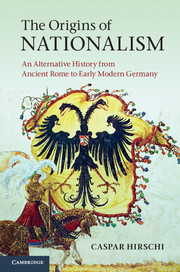Book contents
- Frontmatter
- Contents
- Figures
- Preface
- 1 Introduction
- 2 The modernist paradigm: strengths and weaknesses
- 3 Foundations of a new nationalism theory
- 4 Killing and dying for love: the common fatherland
- 5 Competing for honour: the making of nations in late medieval Europe
- 6 The nationalist transformation of borders and languages
- 7 Humanist nationalism
- 8 A German Emperor for the German people
- 9 Nation and denomination
- 10 Conclusion
- Bibliography of works cited
- Index
8 - A German Emperor for the German people
Published online by Cambridge University Press: 05 June 2012
- Frontmatter
- Contents
- Figures
- Preface
- 1 Introduction
- 2 The modernist paradigm: strengths and weaknesses
- 3 Foundations of a new nationalism theory
- 4 Killing and dying for love: the common fatherland
- 5 Competing for honour: the making of nations in late medieval Europe
- 6 The nationalist transformation of borders and languages
- 7 Humanist nationalism
- 8 A German Emperor for the German people
- 9 Nation and denomination
- 10 Conclusion
- Bibliography of works cited
- Index
Summary
Above all, if one cannot have a German prince elector or prince, any king has to be a German by ancestry and origin, so that the honour of our nation is preserved and the common man is satisfied.
Albrecht of Brandenburg, Archbishop of Mainz, Notes, 1519We are German by blood and disposition, by birth and tongue.
Charles I, King of Spain, Letter to the Prince Elector of Saxony, 1519To modern observers, the political system of pre-modern Europe may easily appear to be the exact opposite of a nationalist order. Monarchs primarily pursued dynastic ambitions, not nationalist agendas. They married their children and grandchildren off to families of foreign rulers, and, as a result, regularly ruled – on perfectly legal grounds – over peoples with whom they shared neither culture nor language. Indeed, dynastic politics was at odds with nationalism in many respects, not least because it was based on hereditary rights established in the early medieval period, when the concept of the nation was not envisaged.
However, the late medieval and early modern period offers ample evidence, too, that dynastic politics both shaped nationalist culture and was shaped by it in return. Emperor Maximilian’s impact on humanist nationalism in Germany was no exception in this regard. Many kings portrayed themselves as paragons of patriotic statesmanship and as defenders of national honour while cultivating their family ties and fostering their territorial claims all over Europe.
- Type
- Chapter
- Information
- The Origins of NationalismAn Alternative History from Ancient Rome to Early Modern Germany, pp. 180 - 195Publisher: Cambridge University PressPrint publication year: 2011

